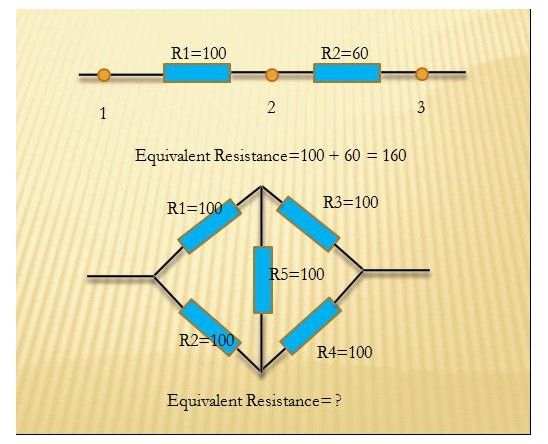hdu3976--Electric resistance(高斯消元问题7)
Electric resistance
Time Limit:1000MS Memory Limit:32768KB 64bit IO Format:%I64d & %I64u
Description
Now give you a circuit who has n nodes (marked from 1 to n) , please tell abcdxyzk the equivalent resistance of the circuit between node 1 and node n. You may assume that the circuit is connected. The equivalent resistance of the circuit between 1 and n is that, if you only consider node 1 as positive pole and node n as cathode , all the circuit could be regard as one resistance . (It's important to analyse complicated circuit ) At most one resistance will between any two nodes.


Input
In the first line has one integer T indicates the number of test cases. (T <= 100)
Each test first line contain two number n m(1<n<=50,0<m<=2000), n is the number of nodes, m is the number of resistances.Then follow m lines ,each line contains three integers a b c, which means there is one resistance between node a and node b whose resistance is c. (1 <= a,b<= n, 1<=c<=10^4) You may assume that any two nodes are connected!
Each test first line contain two number n m(1<n<=50,0<m<=2000), n is the number of nodes, m is the number of resistances.Then follow m lines ,each line contains three integers a b c, which means there is one resistance between node a and node b whose resistance is c. (1 <= a,b<= n, 1<=c<=10^4) You may assume that any two nodes are connected!
Output
for each test output one line, print "Case #idx: " first where idx is the case number start from 1, the the equivalent resistance of the circuit between 1 and n. Please output the answer for 2 digital after the decimal point .
Sample Input
1
4 5
1 2 1
2 4 4
1 3 8
3 4 19
2 3 12
Sample Output
Case #1: 4.21
给出n个节点,和每个节点中的电阻,问总的电阻是多少。
设每个节点的电势为ui那么总的电压为un - u1 , 设流过这个电路的电流为1,那么电阻也就是un - u1了。通过每个节点流入的电流和流出的电流相同,得到n个方程。
设在1节点流入的是-1,n节点流出的是1,那么对于u到v有电阻w,也就是u点的电流 (v-u)/w,对于v点的电流为(u-v)/w ;
得到n个方程后高斯消元,设1节点的电势为0,这样就能直接求出n节点的电势,也就是整个的电阻了。
#include <cstdio>
#include <cstring>
#include <algorithm>
#include <cmath>
using namespace std ;
#define eps 1e-8
double Map[60][60] , a[60] , x[60] ;
void swap1(int p,int q,int n)
{
int i ;
double temp ;
temp = a[p] ; a[p] = a[q] ; a[q] = temp ;
for(i = 1; i <= n ; i++)
{
temp = Map[p][i] ; Map[p][i] = Map[q][i] ; Map[q][i] = temp ;
}
return ;
}
double gauss(int n)
{
int i , j , k , t , max1 ;
double temp ;
for(i = 1 , t = 1 ; i <= n && t <= n ; i++ , t++)
{
max1 = i ;
for(j = i ; j <= n ; j++)
if( fabs(Map[j][t])-fabs(Map[max1][t]) > 0 )
{
max1 = j ;
}
if( fabs(Map[max1][t]) < eps )
{
i-- ;
continue ;
}
if( i != max1 )
swap1(i,max1,n) ;
for(j = i+1 ; j <= n ; j++)
{
if( fabs(Map[j][t]) < eps ) continue ;
temp = Map[j][t] / Map[i][t] ;
a[j] -= (a[i]*temp) ;
for(k = t ; k <= n ; k++)
Map[j][k] -= (Map[i][k]*temp) ;
}
}
for(i = n ; i >= 1 ; i--)
{
x[i] = a[i] ;
for(j = i+1 ; j <= n ; j++)
x[i] -= ( Map[i][j]*x[j] ) ;
x[i] /= Map[i][i] ;
}
return fabs(a[n-1]/Map[n-1][n]) ;
}
int main()
{
int t , tt , n , m , u , v ;
double w ;
scanf("%d", &t) ;
for(tt = 1 ; tt <= t ; tt++)
{
memset(Map,0,sizeof(Map)) ;
memset(a,0,sizeof(a)) ;
scanf("%d %d", &n, &m) ;
a[1] = -1.0 ;
a[n] = 1.0 ;
while(m--)
{
scanf("%d %d %lf", &u, &v, &w) ;
Map[u][u] -= 1.0/w ;
Map[u][v] += 1.0/w ;
Map[v][u] += 1.0/w ;
Map[v][v] -= 1.0/w ;
}
for(int i = 1 ; i <= n ; i++)
Map[i][1] = 0 ;
printf("Case #%d: %.2lf\n", tt, gauss(n) );
}
return 0;
}